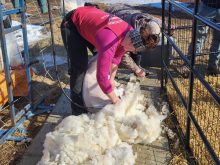OSOYOOS, B.C – Uncertainty is dogging the security of grazing leases for British Columbia ranchers.
The problem arose in November when a Supreme Court of Canada decision said aboriginal groups must be consulted to see if they have an interest in crown land up for lease renewal. The court was dealing with a case between the Haida nation and the forest company Weyerhaeuser. It declared aboriginal interests must be accommodated in the use of public lands.
B.C. ranchers dependent on thousands of acres of crown grazing land are left confused over the status of leases up for renewal. Many of the leases had a 21-year term and no one knows if such a long tenure might be granted again.
Read Also

Charges laid after cattle theft
Saskatchewan RCMP lay two charges against a man after six cattle went missing.
“We don’t want to see a reduction in the resources to the rancher,” said Dave Merz, chair of the aboriginal affairs committee with the B.C. Cattlemen’s Association.
Newly re-elected premier Gordon Campbell promised the land management issue will be settled and that ranchers will have access to crown land for grazing.
“We are not going to stop until we have got that sorted out so you have some confidence of the land base you need, and the rangeland that you need for your cattle and your operations to have the kind of future you need to move forward,” the premier told the cattlemen’s annual meeting in Osoyoos May 27-28.
Most of the public lands in the province have been the subject of unsettled native land claim disputes for more than a decade. In some cases, claims overlap on the same piece of land so several sets of consultations may be required before a lease is renewed. Some of the interests could be minor such as using the land for berry picking or fishing but other aboriginals may wish to develop the land and that could shut a rancher out.
The government, through its agency, Land and Water B.C., has said it will arrange to meet with First Nations people on behalf of the ranchers. Maps of the lease must be provided outlining boundaries, fence lines, watercourses and other improvements made on the land. Management plans must be presented as to how land will be handled.
“Anything that you have on crown land that is up for renewal is going to have to go through these steps,” he said.
Some ranchers want to be present during talks.
“Even if I had a small grazing lease … I would be very concerned who was going to be doing that negotiation on my behalf,” Merz said.
Many grazing leases covering thousands of acres have been in families for more than 100 years but now there is a new set of rules, said Duncan Barnett, a consultant to the beef industry who also ranches near Williams Lake.
“Some of them go back for generations and they are an integral part of the ranch,” said Barnett.
Many of the upcoming renewals are in the southern interior area of Kamloops and Cariboo.
Every contract will be different and could depend on what the First Nations want. No one knows how that might play out or how sharing the land might affect grazing.
“We all know that in B.C. aboriginal issues are pretty complicated and there’s a lot of different groups to deal with and overlapping interests,” Barnett said.
“It is not going to be simple task. It is not going to be a quick task.”
Compensation may be offered to lessees but Barnett suspects that might be handled on a case by case basis.
There are several different leasing options.
The first is a grazing permit giving someone short-term rights to forage in an area. A grazing licence provides limited access to forage but with some tenure security. A grazing lease is a long-term contract where the lessee pays taxes on the land and can make improvements such as adding forage, fencing or water installations.
While decisions are being made, people have received short-term extensions on leases.
Lenders have already raised concerns if long-term tenure is jeopardized.
“It’s hard to say it is an asset of the ranch when you have an interim agreement for it,” Barnett said.
For their planning ranchers would prefer 20-year leases.
“I don’t know if after the consultation process is done if we’ll end up with the 10 year or 20 year tenure,” he said.
The court decision did not give aboriginals the power to veto a lease and required that solid reasons for change must be made.

















